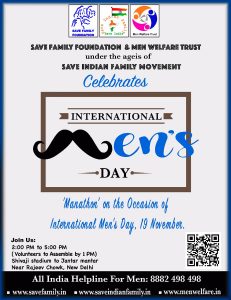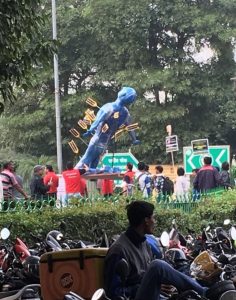Dozens of Delhi men decided to mark International Men’s Day by congregating at Connaught Place and draw attention to the trangressions men face nowadays – specifically from women.
And so, as journalist Akriti Paracer walked through the market she suddenly saw a large blue effigy impaled with bright yellow arrows. The men carrying it told her the arrows symbolised ‘male hatred’, ‘misandry’ and ‘false cases of harassment’ and of course, the attacked, beleaguered effigy represented the ‘Indian man’.
In addition to the effigy, the marchers also shouted slogans including “Kal ki sweetu, aaj ki MeToo” (Today’s sweetu is tomorrow’s MeToo) and “Stop treating husbands as ATM”. The self-proclaimed men’s rights activists are also demanding a male counterpart to the national commission for women, saying they need a specialised body to address men’s grievances in the country.

Wasif Ali, co-founder of the Save Family Foundation – which organised the protest in partnership with the Men Welfare Trust – told India Times, “”We want a ‘Men’s Commission’ to address our concerns. Every year, double the number of men commits suicide than women. 90,000 men commit suicide in India every year, compared to 40,000 women. But there is no one to hear our concerns. There has to be a separate men’s body.”
He also added, “We are leading a peaceful march for the rights for men. Especially if you look at the recent MeToo campaign. The campaign has made it so easy to name and shame any man, without proof or evidence. Men are demonised without any fault of theirs.”
Also read: Why Do Men’s Rights Groups Feel the Need to Defame Women Saying #MeToo?
Paracer also said that some of the men were carrying posters of Haryana chief minister Manohar Lal Khattar, who recently dismissed the uptick in sexual harassment and assault complaints, saying, “Around 80-90% of the rape and molestation cases happen between people who are familiar with each other. They roam around together for days, and when they finally squabble one day, the woman files an FIR saying that she has been raped.”

Men’s rights groups protesting against the MeToo movement in New Delhi’s connaught place area. Image Credit: Akriti Paracer.
“The men protesting had a poster with some statistics on the number of men who commit suicide every year and how many of those are married and equated that to India having been dubbed the “suicide capital of the world”, added Paracer.
This is not the first time these protestors have taken to the streets to highlight their concerns about the state of men in India. On October 22, men’s rights activists participated in the Delhi half marathon, carrying banners with Nana Patekar’s face on them, just days after he’d been accused of sexually harassing Tanushree Dutta. According to a Times of India report, the protest group carried the same blue effigy as well as a poster of US President Donald Trump, probably as a mascot, for their cause.
The demand for men’s commission by the male rights activists across the country has pivoted to issues that are actually borne out of patriarchy that affects men and women alike. The fact that men are committing suicide, as the activists argue, is because society mocks men who express their insecurities and not because women file complaints of sexual assault.
Instead of focusing on this, male rights activists resort to maligning women and the MeToo movement. As far as the false cases of dowry and sexual allegations are concerned, statistics for dowry deaths and sexual assault show that way more women fall victim to gender violence than men. Besides, as several studies have stated, the data cited by male rights activists is in most cases twisted to misguide people.
Other than this, the activists who are supposedly looking out for the rights and interests of men seem to be completely ignorant of the challenges faced by trans men. Caste also seems to take a back seat for these activists as their long list of reasons for constituting a men’s commission fails to acknowledge the rising suicide rates among lower caste men.
In short, the push for the commission is less about the real problems faced by men in general and is more about building an illogical and a baseless counter-narrative to India’s MeToo movement. The movement is therefore hollow, exclusive and dismissive of the larger patriarchal bondages which feed on people irrespective of their gender. There is definitely a need to have a discussion on men and masculinity to understand the power dynamics at play but slogans like “aaj ki sweetu, kal ki metoo” is only going to deepen gender bias.
Feature image credit: Twitter

